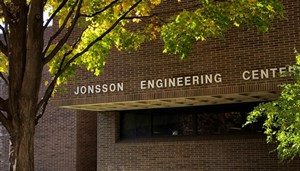
From Puerto Rico to Washington DC via Troy, NY – A journey to improve national infrastructure
Tell us a bit about yourself.
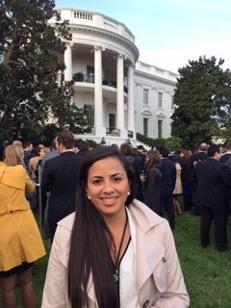
I was born and raised in Puerto Rico. I grew up in a small rural town on the island filled with beautiful coastal views and amazing beaches. I lived there until I graduated from the University of Puerto Rico, Mayaguez Campus with my undergraduate degree and then moved to NY to go to grad school at RPI.
My grandfather really liked building things and built a lot of infrastructure in our hometown. I think that was a source of inspiration for me and I always had a very analytic mindset. I would always participate in science fairs and math competitions in school.
During my undergraduate studies, I became interested in doing research in different fields including green and sustainable initiatives and transportation alternatives that would improve travel and quality of life, particularly in Puerto Rico. RPI was then collaborating with the University of Puerto Rico on those topics and I immediately jumped at the opportunity to collaborate with them, which later morphed into an exciting summer internship at RPI, which gave me the chance to get to know the campus and faculty. I felt supported by RPI faculty, and my experience was so positive that I decided to apply for grad school and joined RPI the following school year.
What was your experience like at RPI?
My experience at RPI was very rewarding and life changing. My mentor and advisor, Dr. Jose Holguin Veras, was instrumental in shaping my experience and many of my RPI colleagues’ experiences. He created an environment that fostered collaboration and community between the students in his group. I immediately connected with other students from Hispanic countries and we created friendships that will last for the lifetime.
At that time, the ratio of women to men at RPI was about 1:10. But that didn’t limit me from participating in extracurricular and professional opportunities. RPI always fostered an environment of inclusivity and community and thanks to that I am happy to see how the number of women at RPI has increased.
I have many special memories of my time at RPI, including the Black Friday hockey games, the skiing club and our trips to Jiminy Peak, and the many amazing opportunities for growth such the entrepreneurship program in coordination with MIT, which allowed me to grow my network with other universities in the region and grow my professional portfolio.
Did RPI education/experience prepare you for success in your career?
My graduate school experience at RPI is a key part for the success I’ve experienced in my career. Not only did RPI prepared me to solve some of the most complex challenges in my profession, but also the networks RPI has developed across the country with the private sector, government, and academia have been instrumental to this day in the work I do daily.
RPI’s engineering challenges students to think outside the box and to keep up to date with challenges in their field. During my time at RPI, many technological advancements were happening including some of the first smart phones and incorporation of GPS tracking systems into vehicle infrastructure. And those new technologies became a key component of some of the research I did for my master’s degree.
You have had an impressive career trajectory already, working for the Federal Highway Administration (FHWA) and the US Department of Transportation (DOT) in the Office of the Secretary. Tell us about that.
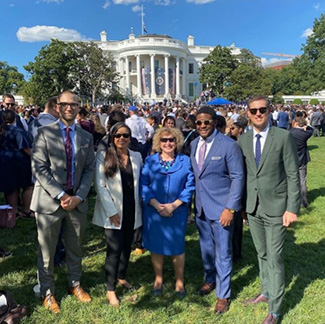
Where I grew up in Puerto Rico, we don’t have many of the complex and modern transportation infrastructure designs we see in cities across mainland U.S. But we did have similar challenges that created unnecessary burdens on the people in those communities. So, I became interested in learning more about how other places approach transportation infrastructure issues and how I could bring that to Puerto Rico to make sure all types of communities across the country had access to safe and reliable transportation options.
In my current role at the USDOT, I advise leadership on the implementation of new transportation infrastructure programs, and I also help develop strategies and policies that will create sustainable and equitable transportation options. This is a historical moment at USDOT and for the country since the passing of the Infrastructure Investment and Jobs Act and I am honored to be part of a team that is helping communities across the country get funding they need for much needed infrastructure investments.
What do you see as the role of DoT in improving infrastructure and lives of people in our country? In Puerto Rico? How can RPI work with the government and help?
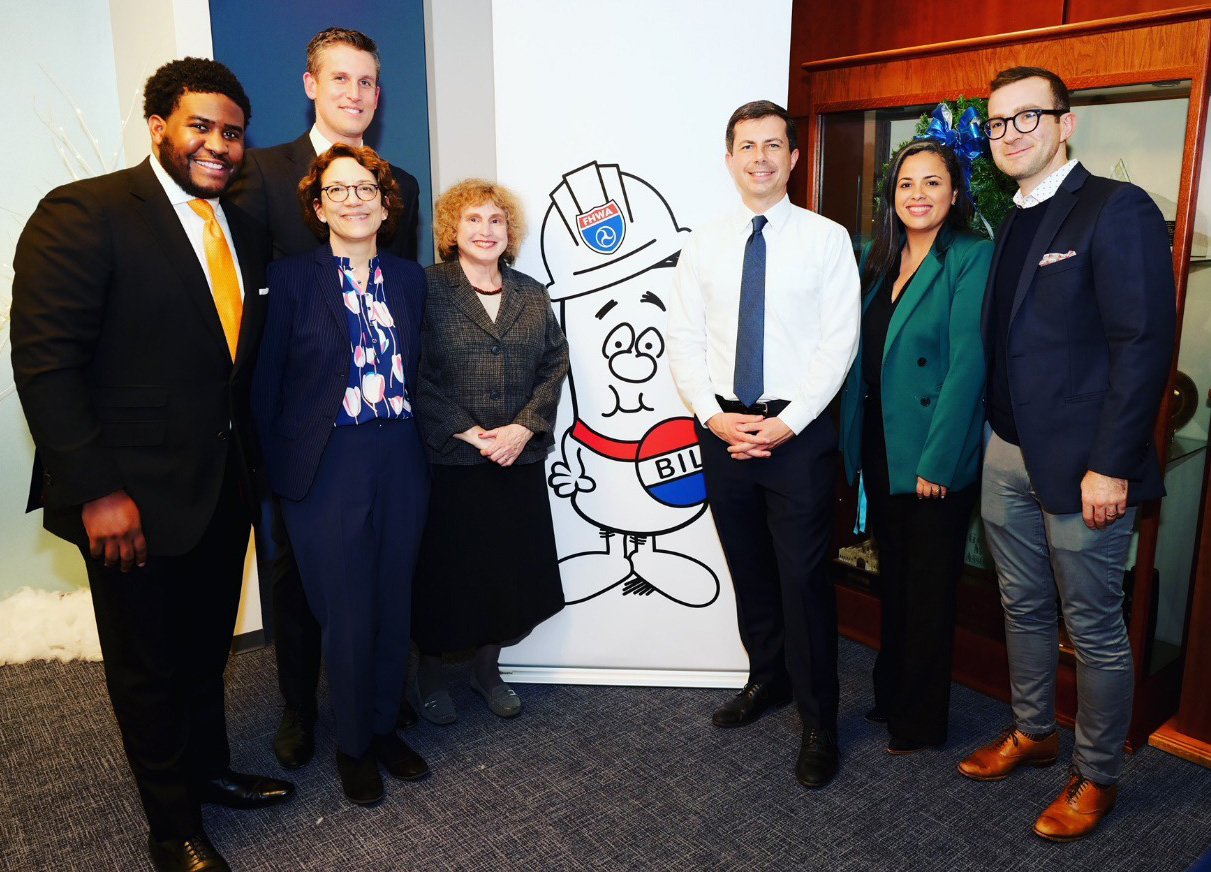
USDOT has a key role in delivering the world’s leading transportation system, serving the American people and economy through the safe, efficient, sustainable, and equitable movement of people and goods. And many people don’t know this, but we have an impact on many of the things people consume every day and how we move around to work, school, and other places. From funding public transportation to the safety standards in all cars driven in the U.S., to building transportation infrastructure that is sustainable and accessible by all.
RPI faculty and programs have been instrumental in the work happening at USDOT and many other agencies. My relationship with USDOT started during my time at the University of Puerto Rico and RPI through the research work I did for USDOT and the National Science Foundation on freight management and emergency response logistic efforts. RPI has always fostered relationships with those communities and the research happening there has been impactful for many of the programs and policies USDOT has developed.
Fostering collaboration with other groups is always a good way to better understand one’s field of study and to create relationships that can improve research and academic programs. That’s how I initially became interested in RPI and I recommend those relationships continue to be fostered with the University of Puerto Rico and the local government in the island. RPI can be very helpful in better understanding some of the challenges the island is dealing with climate change and supply chains during natural disasters.
You exude positive energy and have an optimistic outlook toward the world. How did you develop this mindset?
That’s very kind of you. I just see the world as a conglomerate of people that can work for the common good. I enjoy meeting people and learning about their backgrounds and experiences because that makes me a better person and helps me do a better job for them. I think that is also part of the reason why I was so interested in working in the government. People tend to think of the government as this bureaucratic machine but in reality there are a lot of hard-working people that care about building a better future for communities across the world and leaving a better future for generations to come. That is one of the key things for which I enjoy my job so much, knowing the work I’m doing will have a positive impact for generations and will make our world a better place.
What do you do for fun?
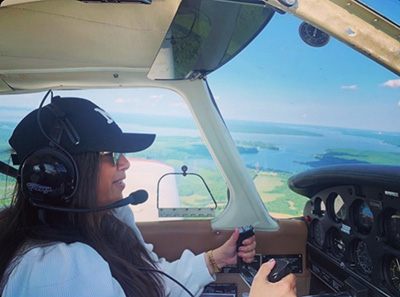 As a true transportation geek, I love to travel and challenge myself to try different modes of transportation while traveling. I’m also trying to get my private pilot’s license, and hopefully, that way I can travel even more. Every year I have a new favorite travel destination. For 2023 it was Colombia. The energy and enthusiasm that people in Colombia have toward the environment and how they find new ways to conserve their natural resources is impressive. In Bogota, during the weekends, they close some of the main avenues in the city for people to be able to walk, bike, and exercise and it’s impressive to see how much people enjoy that idea and how they go out on the weekends to enjoy the roadways from a different perspective. Something truly admirable and hopefully something we can adapt in more places here in the U.S.
As a true transportation geek, I love to travel and challenge myself to try different modes of transportation while traveling. I’m also trying to get my private pilot’s license, and hopefully, that way I can travel even more. Every year I have a new favorite travel destination. For 2023 it was Colombia. The energy and enthusiasm that people in Colombia have toward the environment and how they find new ways to conserve their natural resources is impressive. In Bogota, during the weekends, they close some of the main avenues in the city for people to be able to walk, bike, and exercise and it’s impressive to see how much people enjoy that idea and how they go out on the weekends to enjoy the roadways from a different perspective. Something truly admirable and hopefully something we can adapt in more places here in the U.S.
I have to confess I spent most of my time reading work documents but if I have free time, I’m trying to finish several books including “How to Hide an Empire” by Daniel Immerwahr and “Cracked” by Steven Hawley, both of which have taught me many things that are related to the work I’m currently doing.
What is your message to current Rensselaer students?
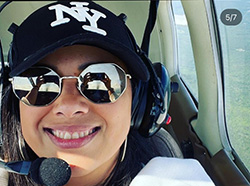 As the first and the oldest engineering school in the country, the impact of RPI alumni around the world is undoubtable. From building some of the most iconic bridges and railroads in this country to serving as Chief Astronaut at NASA, RPI students have the resources and tools to change the world. So, take in all the experiences and the knowledge you will get at RPI and don’t be afraid to challenge the world for more. And for the women pursuing degrees at RPI, there are many women pioneers that have helped paved the way for us including Nancy DeLoye Fitzroy, Emily Warren Roebling, and others, but there are still a lot of challenges we need to overcome to get to equal opportunities in many sectors including engineering and transportation. And by picking RPI for your degree, you have already made a significant step in achieving that goal. So, continue to support one another and create a community that fosters equality and respect for all.
As the first and the oldest engineering school in the country, the impact of RPI alumni around the world is undoubtable. From building some of the most iconic bridges and railroads in this country to serving as Chief Astronaut at NASA, RPI students have the resources and tools to change the world. So, take in all the experiences and the knowledge you will get at RPI and don’t be afraid to challenge the world for more. And for the women pursuing degrees at RPI, there are many women pioneers that have helped paved the way for us including Nancy DeLoye Fitzroy, Emily Warren Roebling, and others, but there are still a lot of challenges we need to overcome to get to equal opportunities in many sectors including engineering and transportation. And by picking RPI for your degree, you have already made a significant step in achieving that goal. So, continue to support one another and create a community that fosters equality and respect for all.
